Apple's 2010 MacBook Air (11 & 13 inch) Thoroughly Reviewed
by Anand Lal Shimpi on October 26, 2010 10:08 PM EST- Posted in
- Mac
- Apple
- MacBook Air
- Laptops
The 11-inch as a Windows Notebook
As a follow-up to our Nvidia 320M/MacBook Pro 13 article last week, I’ve been running our Windows test suite on the MacBook Air 11”. I, like Anand, have the lowest end 11”er, with 2GB memory and the 64GB SSD. This makes installing Windows an interesting proposition since after the two OS installs, you’ve got right around 30GB of free disk space to work with. My suggestion - if you plan on installing Windows and dual booting often, save yourself the headache and get the 128GB model.
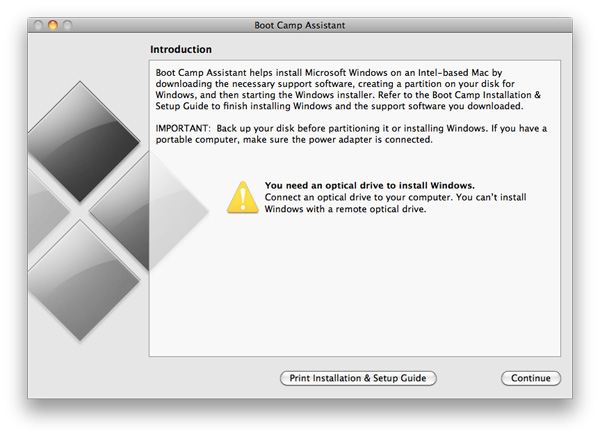
The other quirk with putting Windows on the Air is that it must be done with a USB optical drive - no hard drive/thumb drive installs. Interestingly, my external optical drive wasn’t recognized as a bootable drive, so I had to run out and grab an Apple SuperDrive. Apple says that you just need an external DVD drive, without specifying the MacBook Air SuperDrive, but your mileage may vary.
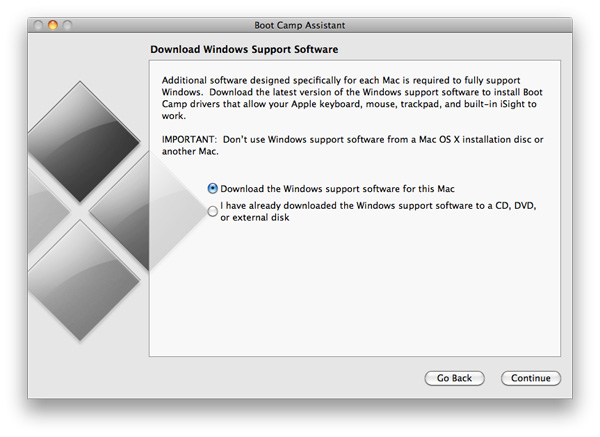
Boot Camp Drivers are now downloaded from Apple's servers prior to the Windows installation
With the Windows install out of the way, we were free to test the living daylights out of it, and that we most certainly did. The 11” Air has the same 1.4GHz Core 2 Duo SU9400 as the similarly thin Dell Adamo 13. Months after we move to Arrandale ULV, leave it to Apple to bring the good old CULV platform back to relevance. As expected, Cinebench and the x264 encoding test gave us results around the same level as the Adamo and the rest of the old CULV gang. Versus the 13” MacBook Pro, you’re looking at roughly a 40% decrease in the CPU compute-heavy benchmarks, roughly equivalent to the reduction in clock speed from the 2.4GHz Pro to the 1.4GHz Air. Arrandale ULV notebooks, such as the Alienware M11x and its Core i7-620UM, are another matter entirely, with the newer architecture posting numbers nearly doubling the Air’s Core 2 processor.
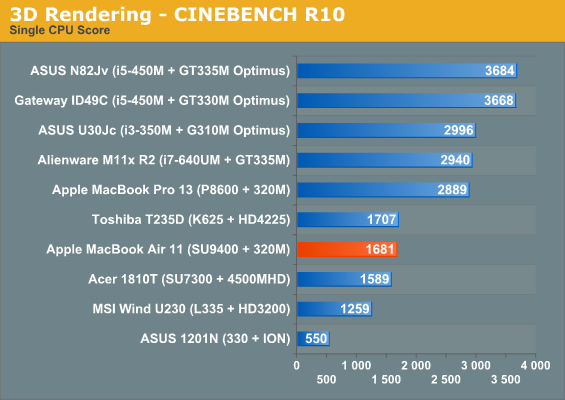
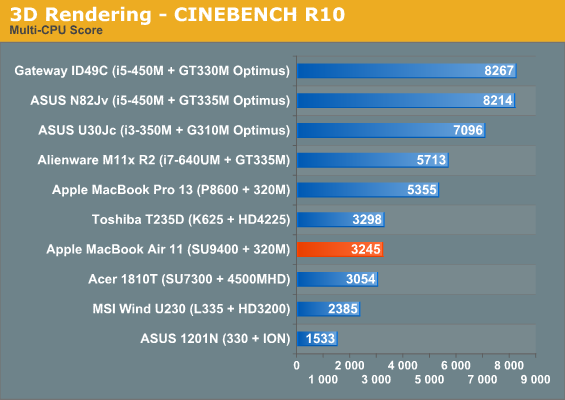
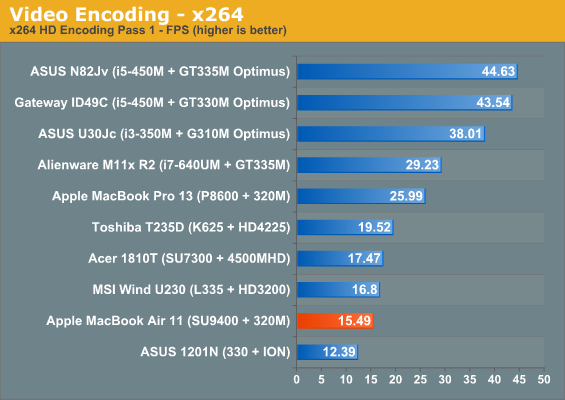
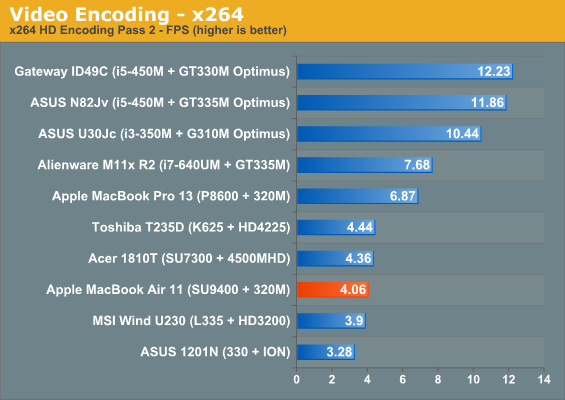
The gaming benchmarks get a bit more interesting. We’re looking at the same GT 216-derived GeForce 320M that was in the MacBook Pro 13, with the same 450MHz core and 950MHz shader clocks. Based on the performance we saw out of the Pro 13, we know that the Air, even in 11” form, can still hold its own in games.
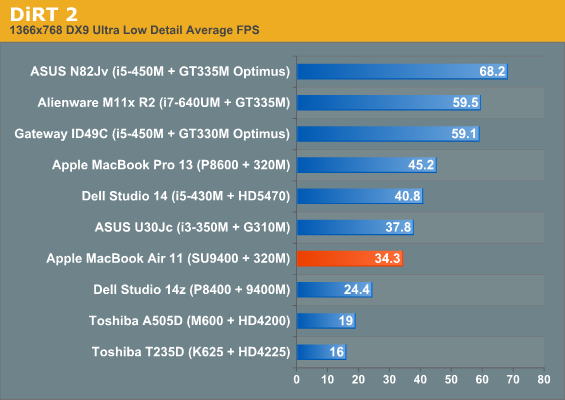
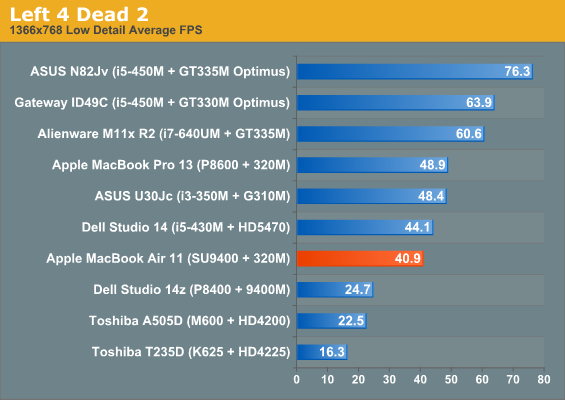
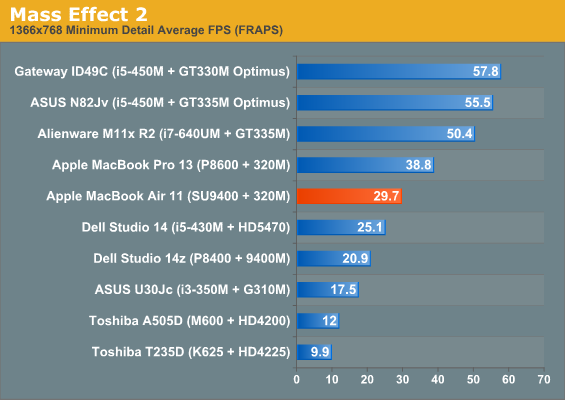
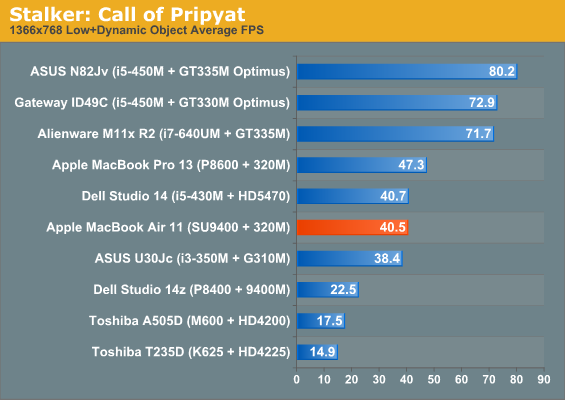
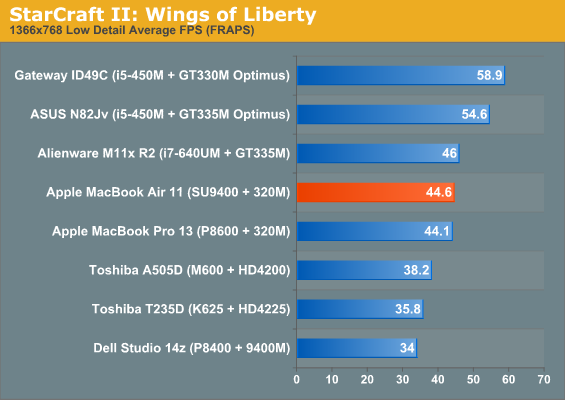
At low detail settings, the Air is pretty consistently 20% slower than the Pro 13, except in SC2, where they were roughly equal. Given that the GPU is identical and that both are using 256MB of the system’s DDR3 1066 memory, it is likely that the 1.4GHz Core 2 Duo is slow enough to put a bottleneck on gaming performance. It’s still a ways ahead of the ASUS Core i3/G 310M combo, and all of our games are playable at native resolution.
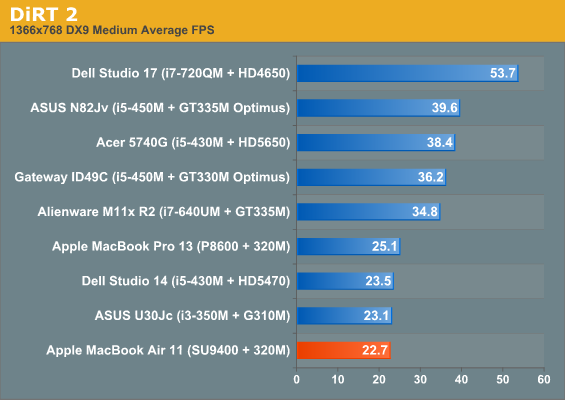
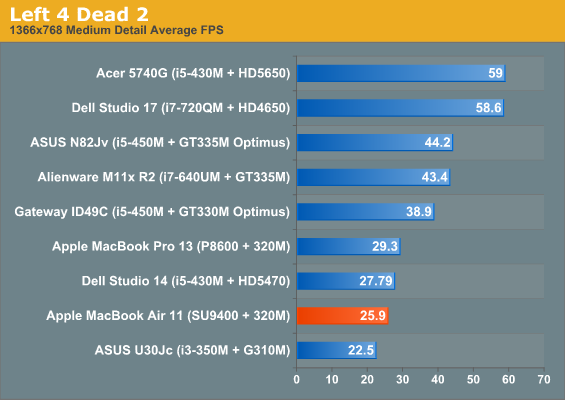
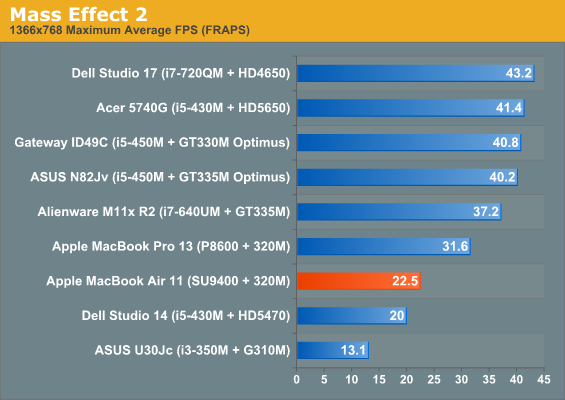
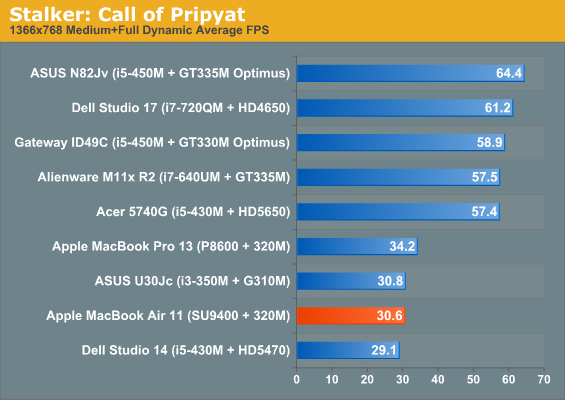
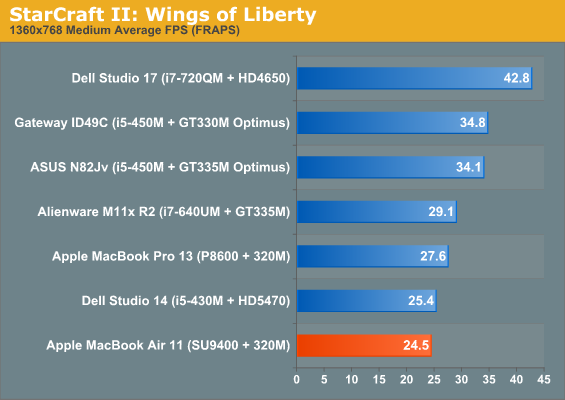
At medium settings though, the Air starts to fall off a bit. Where the MBP13 was borderline-playable, always between the 25-35 fps range, the Air is about 10% behind and makes it to the magical 30fps mark in STALKER, but nothing else. DiRT 2, Left 4Dead 2, Mass Effect 2, and StarCraft II all ended up between 22 and 26 fps, still faster than the G 310M, but not quite playable. Another interesting concern during gaming is heat. The Air isn’t the coolest notebook in the world, with idle temps hovering around 50C, but while running the gaming tests, I saw GPU temps rise up into the 70s. Nothing too alarming, but still pretty toasty and more than enough to get the fans spinning to the max.
But let’s put this all in perspective. This isn’t about just an 11.6” notebook that can game - the 11.6” M11x is the fastest gaming notebook under 5lbs, but even then it’s still a full two times heavier than the MB Air 11. The Air 11 shoehorns quite a bit of power into one of the smallest form factors on the market. Having a GT 216 core in an enclosure this small and being able to run these games at 40 fps at native resolution is definitely very impressive.










185 Comments
View All Comments
khimera2000 - Wednesday, October 27, 2010 - link
I love me m11x R2 :D looking at this thing... im happy that its still speedier, and i dont care who you are something as thin as the macbook would freak me the !@#$ out if i droped it... more so then the one i have right now. (mono frame = expensive fix)The0ne - Wednesday, October 27, 2010 - link
"I really like the form factor of the 11-inch MacBook Air. It's great to carry around. It's like an iPad for people who have to get real work done. I just wish it was faster. If Intel made a 32nm Core 2 Duo, clocked high enough the 11 would be perfect. I guess that’s what Atom is eventually supposed to be, but right now the performance is just too low."Essentially this means the 11" MacBook is NOT suitable unless you want to wait and wait. You won't get any "real work done" by any means as it is. So why even bother to praise it and at the same time downgrade it.
A netbook is both usable AND CHEAP. These are not and thus should not be called or even be consider netbooks. That's just crazy talk there. Might as well call all the rest of the ultra light notebooks netbooks.
kmmatney - Wednesday, October 27, 2010 - link
It has an SSD, so no, you don't need to wait and wait. I agree with Anand's review - it is like a netbook in terms of portability, but its much faster, and has a much better screen. It's certainly more usable than the average netbook.KarateBob - Wednesday, October 27, 2010 - link
Good review so far, until you listed the system temperatures in Fahrenheit. I understand Apple lists the temps in (F), but the industry-standard units for temperature reading is Celcius. It's what most enthusiasts can understand. (ie. We 60C is getting hot for a pre-i7 CPU, but I couldn't tell you what 60C is in F)Can you please add Celcius numbers to the review, perhaps next to the Fahrenheit numbers, it will make the article much more comprehensible. Thanks
Sufo - Wednesday, October 27, 2010 - link
I was just about to make this point - good thing i read through the comments before hand heh.I was very very disappointed by the use of F here at all, let alone it being the only scale used. Technical hardware reviews, for me, fall into the realm of science (albeit loosely) and C is the de facto standard in the scientific world (well, at least while it isn't K). Many component monitoring applications do not even have the option to display temps in F, and if they do, it is rarely (if ever) the default selection.
So +1 to the request for at least displaying both numbers in future, and perhaps you could consider dropping F completely as i'd argue it has no context within the world of computing hardware.
Anand Lal Shimpi - Wednesday, October 27, 2010 - link
Temperatures in C as well as F are both present now :)Take care,
Anand
SraCet - Wednesday, October 27, 2010 - link
To the reviewers and many commenters, it is tedious to listen to you divide the world into people who do "real work" and people who just fool around with IM and check Facebook.I do software development and scientific computing and for my purposes, the 11.6" MacBook Air is more than powerful enough.
Reading your review, it sounds like the only things you consider "real work" are editing 12 megapixel photos, doing 3D renders, and (ironically) playing 3D video games.
5 years ago, a 1.4GHz Core 2 Duo would have almost been the fastest CPU money could buy. Are you saying that people only started doing "real work" with their computers sometime in the last 5 years?
Sorry, let me go back to writing code and running simulations, and stop interrupting your "real work"--i.e., resizing your pretty pictures because you took them at 20 times the resolution you actually needed for web publishing.
Sufo - Wednesday, October 27, 2010 - link
"5 years ago, a 1.4GHz Core 2 Duo would have almost been the fastest CPU money could buy. Are you saying that people only started doing "real work" with their computers sometime in the last 5 years?"Well, only if you interpret his comments as suggesting that these tasks are _impossible_ to perform on the 11" MBA. Of course, that would be a gross misinterpretation - as i'm sure you can see. A more relevant extrapolation might be that 5 years ago, performing said tasks was a sluggish and intolerable chore - and on that we probably see eye to eye.
As for the "real work" slur - i can understand your frustration, however you must realise that a large part (probably the largest part) of the non-casual MBA-buying demographic will be people who consider the "real work" of the article as well... "real work" - and you can't get angry at the reviewers for trying to include usage statistics tailored to the people most likely to be buying the device. If anything it is to their credit. Similarly, it is unrealistic to expect them to cover every single usage scenario.
SraCet - Wednesday, October 27, 2010 - link
I suspect a very small percentage of professionals do anything that would stress out a Core 2 Duo. Most people do word processing, spreadsheets, presentations, e-mail. Editing and compiling code (developers). Accessing other computers remotely (IT types). Web browsing for business, like arranging travel. etc. etc.According to the reviewers, and apparently you, all of this stuff can be lumped in with "casual" (your word) use and is not "real work" because it can be done without taxing a dual core 1.4GHz processor.
Sufo - Friday, October 29, 2010 - link
Ah, you've somewhat misinterpreted me here - the term "non-casual" was merely meant to identify people who use their machine for work purposes. Perhaps i should have used "professional". My overall point (as misguided as it may be) was really only alluding to the generalisation that most people who buy macs are artsy, journalist types - for whom editing pictures and obscenely flash-heavy websites etc is their normal, "real" workload. And yes, i realise this thread is dead :)